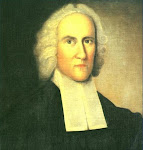How badly do we long for the gospel to do its transforming work in our hearts? The following is an excerpt from the personal journal of the colonial American Pastor Jonathan Edwards (1703-57), found in The Works of Jonathan Edwards, reprinted ed. (Carlisle, Penn.: Banner of Truth, 1990), 1:xlvii:
I have loved the doctrines of the gospel; they have been to my soul like green pastures. The gospel has seemed to me the richest treasure, the treasure that I have most desired, and longed that it dwell richly in me. The way of salvation by Christ has appeared, in a general way, glorious and excellent, most pleasant and most beautiful. It has often seemed to me that it would in a great measure spoil heaven to receive it any other way.
